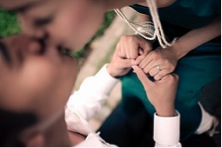 Estate planning is serious family business with serious future repercussions, regardless if the family is a unit of two married spouses or a single-parent household. The complexity of planning and the issues involving guardianship, conservatorship, and caring for a spouse are further complicated with a second marriage.
Estate planning is serious family business with serious future repercussions, regardless if the family is a unit of two married spouses or a single-parent household. The complexity of planning and the issues involving guardianship, conservatorship, and caring for a spouse are further complicated with a second marriage.
Before discussing the implications of a second marriage on an estate plan, it’s important that folks understand that any change in marital status affects any previously established estate plan. Under Ohio law, a surviving spouse inherits everything in situations where the decedent spouse did not leave a will (known as intestate) and there are no children. The divorce of spouses does not carry that automatic inheritance with the departing spouse.
Likewise, in situations of death or divorce where spouses have taken the time to create a will or a trust, the estate does not automatically go to the named person. The reason is because of a presumption under Ohio law that naming one’s spouse does not mean naming that person indefinitely.
So, it’s understandable that a second marriage would bring specific estate planning rules. Welcoming new children, new property, assets from a previous divorce, or children from a first marriage—all these require special attention in an estate plan for a second marriage.
This article discusses some of these issues in mostly general terms but does not address Ohio law specifically. One important issue involves how the adult children of a first marriage will be treated, while still addressing the share that a second spouse would receive. Another critical issue is how to deal with titled real estate, especially the primary residence.
“The most common (but imperfect) remedy is to grant the non-owner survivor a life estate in the home. Then upon the subsequent death of the survivor, the home will revert to the adult children or other beneficiaries of the first to die.” But as the article points out, the adult children of the deceased parent would be “unable to sell the home or otherwise use it regardless of whether the survivor gets remarried, moves away or winds up in a nursing home for years. To add insult to injury, the nursing home would be entitled to require that the property be rented out and the income used toward the survivor’s care.”
These are just two examples, although they make salient points. Speak with an experienced Dayton estate planning attorney for more information on how a second marriage affects your estate plans.
The post Estate Planning in a Second Marriage appeared first on Lovett & House Co., LPA.
